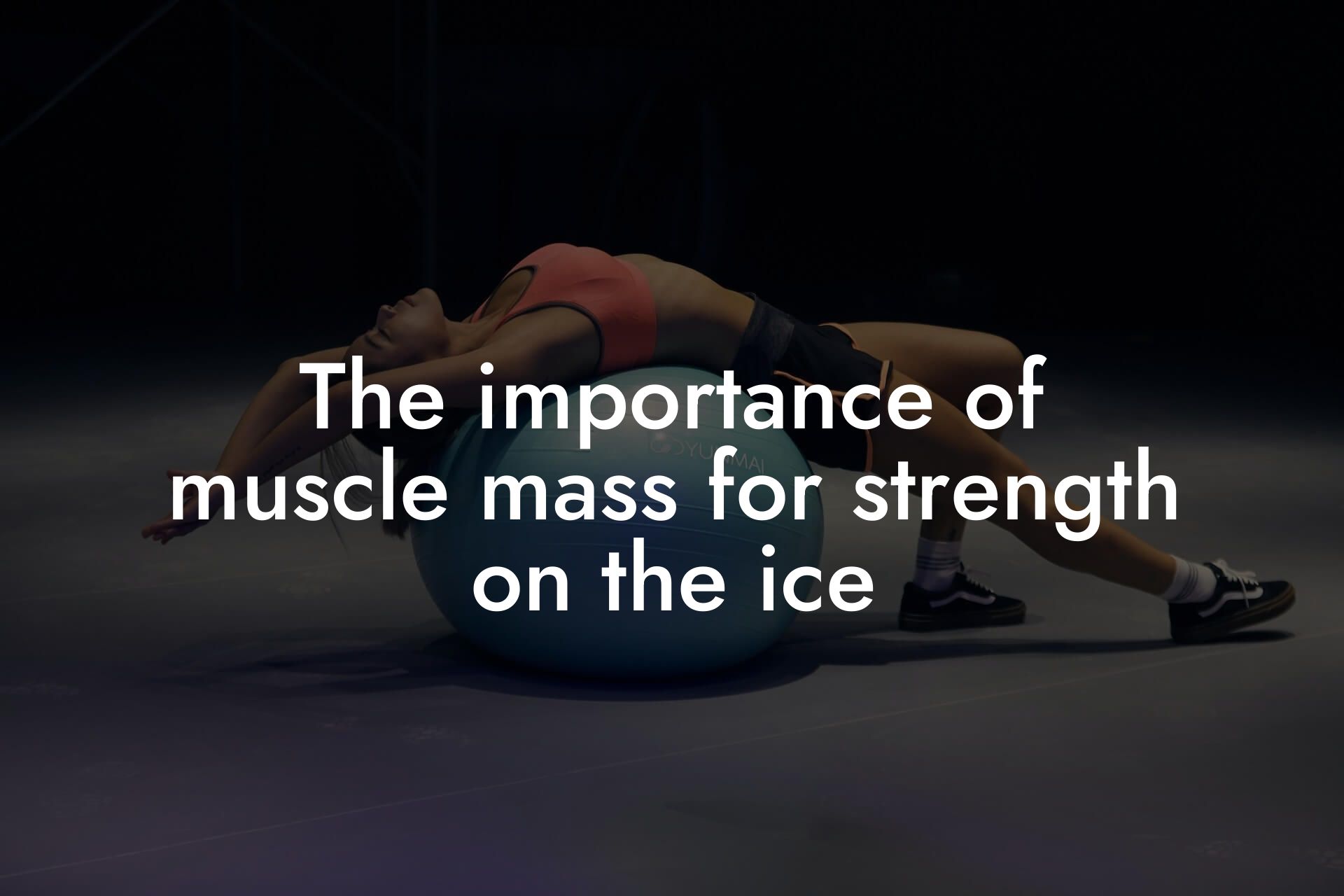As an amateur hockey player, you understand the importance of maintaining a high level of physical fitness to stay competitive on the ice. Whether you're looking to improve your game, reduce your risk of injury, or simply feel more confident in your body, a DEXA (Dual-Energy X-ray Absorptiometry) scan can be a game-changer. At Tano Performance Group, we're dedicated to helping high-earning professionals like you achieve their physical goals, and a DEXA scan is a crucial tool in that journey.
Table of Contents
What is a DEXA Scan?
A DEXA scan is a non-invasive, pain-free test that uses low-level X-rays to measure bone density, body composition, and fat distribution. The scan produces a detailed report that provides valuable insights into your body's composition, allowing you to make informed decisions about your training, nutrition, and overall health. In just a few minutes, a DEXA scan can provide a wealth of information that would take months or even years to gather through traditional methods.
Benefits of DEXA Scans for Amateur Hockey Players
As an amateur hockey player, you're likely no stranger to the physical demands of the sport. From the intense physicality of the game to the repetitive strain of skating, shooting, and passing, hockey can take a toll on your body. A DEXA scan can help you optimize your performance, reduce your risk of injury, and improve your overall health in several ways:
Body Composition Analysis
A DEXA scan provides a detailed breakdown of your body composition, including lean mass, fat mass, and bone density. This information is crucial for hockey players, as it allows you to:
- Identify areas of your body that may be prone to injury due to excess fat or muscle imbalances
- Optimize your nutrition and training to build lean muscle mass and improve power-to-weight ratio
- Monitor changes in your body composition over time, ensuring you're on track to meet your performance goals
Bone Density Analysis
As a hockey player, you're at risk of osteoporosis and other bone-related injuries due to the high-impact nature of the sport. A DEXA scan can help you:
- Identify early signs of osteoporosis or low bone density, allowing you to take proactive steps to prevent further deterioration
- Monitor the effectiveness of your training and nutrition program on bone health
- Reduce your risk of fractures and other bone-related injuries
Injury Prevention and Management
A DEXA scan can help you identify potential injury risks and develop strategies to mitigate them. By analyzing your body composition and bone density, you can:
- Identify areas of your body that may be prone to overuse or strain, allowing you to modify your training program to reduce the risk of injury
- Develop targeted strengthening and conditioning exercises to improve joint stability and reduce the risk of injury
- Monitor the effectiveness of your injury rehabilitation program, ensuring you're on track to return to the ice at full strength
Performance Enhancement
A DEXA scan can help you optimize your performance on the ice by providing valuable insights into your body's composition and function. By analyzing your scan results, you can:
- Identify areas of your body that may be limiting your performance, such as excess fat or muscle imbalances
- Develop targeted training and nutrition programs to improve power, speed, and agility
- Monitor changes in your body composition over time, ensuring you're on track to meet your performance goals
Convenience and Accuracy
A DEXA scan is a quick, painless, and non-invasive test that can be completed in just a few minutes. Unlike traditional methods of body composition analysis, such as skinfold measurements or bioelectrical impedance analysis (BIA), a DEXA scan provides highly accurate and reliable results. This means you can trust the information you receive and make informed decisions about your training and nutrition program.
As an amateur hockey player, you understand the importance of maintaining a high level of physical fitness to stay competitive on the ice. A DEXA scan is a powerful tool that can help you optimize your performance, reduce your risk of injury, and improve your overall health. By providing valuable insights into your body's composition and function, a DEXA scan can help you take your game to the next level. At Tano Performance Group, we're dedicated to helping high-earning professionals like you achieve their physical goals. Contact us today to learn more about the benefits of DEXA scans for amateur hockey players.
Frequently Asked Questions
What is a DEXA scan, and how does it work?
A DEXA (Dual-Energy X-ray Absorptiometry) scan is a non-invasive, painless medical imaging test that measures bone density and body composition. It uses X-rays to produce images of the inside of the body, which are then analyzed to provide detailed information about bone density, lean mass, and body fat percentage. This information can be used to assess overall health, monitor changes over time, and identify potential health risks.
Why are DEXA scans important for amateur hockey players?
Amateur hockey players are at a higher risk of osteoporosis and fractures due to the physical demands of the sport. DEXA scans can help identify early signs of bone loss, allowing players to take preventative measures to maintain strong bones and reduce the risk of injury. Additionally, DEXA scans can provide valuable information about body composition, helping players optimize their training and nutrition for improved performance.
How accurate are DEXA scans?
DEXA scans are highly accurate, with a margin of error of around 1-2%. This is because the scan uses a precise measurement of bone density and body composition, which is then compared to a large database of healthy individuals to determine the results.
Is a DEXA scan safe?
Yes, DEXA scans are completely safe and non-invasive. The scan uses a very low dose of X-rays, which is much lower than a typical chest X-ray. The scan is also quick, taking around 10-15 minutes to complete.
How often should I get a DEXA scan?
The frequency of DEXA scans depends on individual circumstances. For amateur hockey players, it's recommended to get a scan every 1-2 years to monitor changes in bone density and body composition. However, if you have a history of osteoporosis or other health conditions, your doctor may recommend more frequent scans.
What can I expect during a DEXA scan?
During a DEXA scan, you'll lie on a flat table, and the scanner will pass over your body, taking images of your bones and body composition. You'll be asked to remain still and hold your breath for a few seconds during the scan. The entire process is quick and painless.
How long does it take to get the results of a DEXA scan?
The results of a DEXA scan are typically available within 24-48 hours. Your doctor or healthcare provider will review the results with you, explaining what they mean and providing recommendations for improvement.
What do the results of a DEXA scan mean?
The results of a DEXA scan provide information about bone density, lean mass, and body fat percentage. The results are usually presented in the form of a T-score, which compares your bone density to that of a healthy young adult. A T-score of -1 or higher is considered normal, while a score of -2.5 or lower indicates osteoporosis.
Can a DEXA scan help me improve my hockey performance?
Yes, a DEXA scan can help you improve your hockey performance by providing valuable information about your body composition. By identifying areas for improvement, such as increasing lean mass or reducing body fat percentage, you can tailor your training and nutrition to optimize your performance on the ice.
How does body composition affect hockey performance?
Body composition plays a critical role in hockey performance. Excess body fat can slow you down and reduce endurance, while lean mass is essential for power, speed, and agility. By maintaining an optimal body composition, you can improve your overall performance and gain a competitive edge.
Can a DEXA scan help me reduce my risk of injury?
Yes, a DEXA scan can help you reduce your risk of injury by identifying areas of low bone density. By taking preventative measures, such as increasing calcium and vitamin D intake, you can strengthen your bones and reduce the risk of fractures and osteoporosis.
How much does a DEXA scan cost?
The cost of a DEXA scan varies depending on the location and provider. On average, the cost of a DEXA scan ranges from $100 to $300. However, some insurance plans may cover the cost of the scan, so it's essential to check with your provider before scheduling.
Is a DEXA scan covered by insurance?
Some insurance plans may cover the cost of a DEXA scan, especially if you have a history of osteoporosis or other health conditions. However, it's essential to check with your provider before scheduling to determine coverage and any out-of-pocket costs.
Can I get a DEXA scan at any age?
Yes, DEXA scans can be performed at any age. However, the scan is most beneficial for individuals over the age of 30, as bone density typically peaks in the mid-20s and begins to decline in the 30s.
How does a DEXA scan differ from a bone density test?
A DEXA scan is a type of bone density test, but it provides more detailed information about body composition and bone density. A bone density test typically measures bone density at a single site, such as the hip or spine, while a DEXA scan measures bone density and body composition at multiple sites.
Can a DEXA scan help me monitor changes in my body composition over time?
Yes, a DEXA scan can help you monitor changes in your body composition over time. By comparing the results of multiple scans, you can track changes in lean mass, body fat percentage, and bone density, allowing you to adjust your training and nutrition accordingly.
How does a DEXA scan compare to other body composition tests?
A DEXA scan is considered one of the most accurate and reliable methods of measuring body composition. It provides detailed information about lean mass, body fat percentage, and bone density, making it a valuable tool for athletes and individuals looking to optimize their physical performance.
Can I use a DEXA scan to track my progress towards my fitness goals?
Yes, a DEXA scan can be a valuable tool for tracking progress towards your fitness goals. By monitoring changes in body composition and bone density, you can adjust your training and nutrition to optimize your results and achieve your goals.
How does a DEXA scan benefit individuals with a history of osteoporosis?
A DEXA scan can benefit individuals with a history of osteoporosis by providing detailed information about bone density and body composition. This information can be used to develop a personalized treatment plan, monitor changes over time, and reduce the risk of fractures and other complications.
Can a DEXA scan be used to diagnose other health conditions?
Yes, a DEXA scan can be used to diagnose other health conditions, such as sarcopenia (age-related muscle loss) and cachexia (muscle wasting). It can also provide valuable information about overall health and wellness.
How does Tano Performance Group use DEXA scans to help clients?
Tano Performance Group uses DEXA scans as a valuable tool to help clients optimize their physical performance and achieve their fitness goals. Our team of experts uses the results of the scan to develop personalized training and nutrition plans, providing clients with a comprehensive approach to improving their overall health and wellness.
What sets Tano Performance Group apart from other fitness and wellness providers?
Tano Performance Group sets itself apart from other fitness and wellness providers by offering a comprehensive approach to improving physical performance and overall health. Our team of experts uses cutting-edge technology, including DEXA scans, to provide clients with personalized solutions tailored to their unique needs and goals.
Here are some related articles you might love...
- Nutrition tips for maintaining energy on the ice
- The importance of muscle mass for strength on the ice
- Reducing body fat for better speed and agility in hockey
- Off-season training strategies for amateur hockey players
- Recovery techniques for hockey athletes after games
- How body composition affects hockey performance
- Strength and conditioning programs for hockey players
- Balancing strength, speed, and agility in hockey
- Bone density and injury prevention in hockey
Zak Faulkner
Zak Faulkner is a leading authority in the realm of physical health and body composition analysis, with over 15 years of experience helping professionals optimise their fitness and well-being. As one the experts behind Tano Performance Group, Zak has dedicated his career to providing in-depth, science-backed insights that empower clients to elevate their physical performance and overall health.
With extensive knowledge of DEXA technology, Zak specializes in delivering comprehensive body assessments that offer precise data on body fat, muscle mass, bone density, and overall physique. His expertise enables individuals to make informed decisions and achieve their fitness goals with accuracy and confidence. Zak’s approach is rooted in a deep understanding of human physiology, combined with a passion for helping clients unlock their full potential through personalised strategies.
Over the years, Zak has earned a reputation for his commitment to excellence, precision, and client-focused service. His guidance is trusted by top professionals who demand the best when it comes to their health. Whether advising on fitness programs, nutritional strategies, or long-term wellness plans, Zak Faulkner’s insights are a valuable resource for anyone serious about taking their health and fitness to the next level.
At Tano Performance Group, Zak continues to lead our Content Team revolutionising how professionals approach their physical health, offering unparalleled expertise that drives real results.




